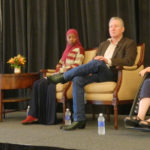No silver bullet offers a single solution to end hunger, but the combined efforts of many advocates provide plenty of silver buckshot to bring down the problem, Suzii Paynter told participants at the Together at the Table Hunger and Poverty Summit in Waco.
 Suzii Paynter, executive coordinator of the Cooperative Baptist Fellowship, shared personal stories of how people can make a difference in public policy. (Photo: Baylor University)The Texas Hunger Initiative—headquartered in Baylor University’s School of Social Work and launched by Texas Baptists’ Christian Life Commission when Paynter directed the agency—sponsored the summit in conjunction with Feeding Texas and the USDA Food & Nutrition Service Southwest Regional Office.
Suzii Paynter, executive coordinator of the Cooperative Baptist Fellowship, shared personal stories of how people can make a difference in public policy. (Photo: Baylor University)The Texas Hunger Initiative—headquartered in Baylor University’s School of Social Work and launched by Texas Baptists’ Christian Life Commission when Paynter directed the agency—sponsored the summit in conjunction with Feeding Texas and the USDA Food & Nutrition Service Southwest Regional Office.
Paynter, now executive coordinator of the Cooperative Baptist Fellowship, called her own introduction to public policy advocacy as evidence of “the hilarious imagination of God.”
More than 20 years ago, she taught reading in Baylor’s School of Education and served as president of the Texas Reading Teachers Association. When a powerful state senator announced his intent to shut down all the colleges of education in the state, her dean at Baylor urged her to go to Austin to try to make an impact.
After a discouraging visit with a political consultant who pointedly noted all her deficiencies, Paynter realized the senator would present his bill to a joint committee of Texas House and Senate members—and each of those lawmakers learned reading from a first-grade teacher.
 So, she contacted each committee member’s first-grade teacher, enlisted those teachers to contact the lawmakers and urged them to vote against the bill to kill the schools of education. Every member of the committee voted against the bill, and the sponsoring senator called Paynter to arrange a meeting the next morning.
So, she contacted each committee member’s first-grade teacher, enlisted those teachers to contact the lawmakers and urged them to vote against the bill to kill the schools of education. Every member of the committee voted against the bill, and the sponsoring senator called Paynter to arrange a meeting the next morning.
“By 9:30, the venerable Texas education code had reinstated colleges of education—and had added for elementary teachers an interdisciplinary major, including reading, that stands to this day,” she said.
“This is one story from my life of how giving over to something bigger than my ideas was a path to faithfulness. I was willing to go into a seemingly untenable, embarrassing—if not impossible—situation and live into the simple gifts we had.”
As a classroom teacher, Paynter experienced an awakening to the problem of hunger. One of her students took pencils from all the other students in class and exhausted the supply she kept in her desk.
Sign up for our weekly edition and get all our headlines in your inbox on Thursdays
 Participants in the Together at the Table Hunger & Poverty Summit in Waco were challenged to make a collective impact to end hunger. (Photo: Baylor University)“I had no pencils left. In frustration, I went to put a stop to this, only to find out that he was taking pencils for the most unlikely reason—to eat the erasers,” she said. “Every day, he was coming to school hungry.”
Participants in the Together at the Table Hunger & Poverty Summit in Waco were challenged to make a collective impact to end hunger. (Photo: Baylor University)“I had no pencils left. In frustration, I went to put a stop to this, only to find out that he was taking pencils for the most unlikely reason—to eat the erasers,” she said. “Every day, he was coming to school hungry.”
Paynter offered two reasons that motivate her advocacy to fight hunger. First, of all the public miracles Jesus could have performed, he chose to feed the multitudes, she noted. Second, the fight against hunger offers an opportunity to work together to address a basic human need.
“Ending hunger is doable, and in the doing of it, we will become a better state, a better nation and a better world,” she said.
Citing the Stanford Social Innovation Review, Paynter noted five conditions of collective impact evident in the Texas Hunger Initiative and its partners—a common agenda, shared measurement, mutually reinforcing activities, continuous communication and backbone support that undergirds the work of others.
Mindset changes need to occur for big change—such as an end to hunger—to happen, she continued. They center on how people work together and how progress takes place.
“Tending to relationships as well as the rationale of a solution is essential to success,” she said.
 Suzii Paynter told participants at the Hunger Summit that each person has gifts that combine with others to make a significant difference in fighting to end hunger and poverty. (Photo: Baylor University)That involves sharing credit—even when donors and foundations reward nonprofit organizations for demonstrating “evidence of their unique impact,” she noted.
Suzii Paynter told participants at the Hunger Summit that each person has gifts that combine with others to make a significant difference in fighting to end hunger and poverty. (Photo: Baylor University)That involves sharing credit—even when donors and foundations reward nonprofit organizations for demonstrating “evidence of their unique impact,” she noted.
No single strategy, no single individual and no single agency offers the answer to the problem of hunger, she said.
“Look for silver buckshot instead of the silver bullet,” Paynter said. “I have yet to find or meet a silver bullet. There is no one thing that will make hunger disappear.”
Instead, she suggested, recognize each person has gifts that combine with others to make a significant difference.
“Accept the unfinished business of your life. You do not know which impartial, imperfect, unfinished parts of your story will be a part of God’s golden theme. … We are not in charge of the inspiration and the arc of our lives toward the greater impact of our work and the kingdom of God. We are in charge of our obedience, persistence and creativity. We are in charge of our vision for a larger story that serves a greater good,” she said.
“We are not alone but held in the great, fertile imagination of God for blessing.”














We seek to connect God’s story and God’s people around the world. To learn more about God’s story, click here.
Send comments and feedback to Eric Black, our editor. For comments to be published, please specify “letter to the editor.” Maximum length for publication is 300 words.